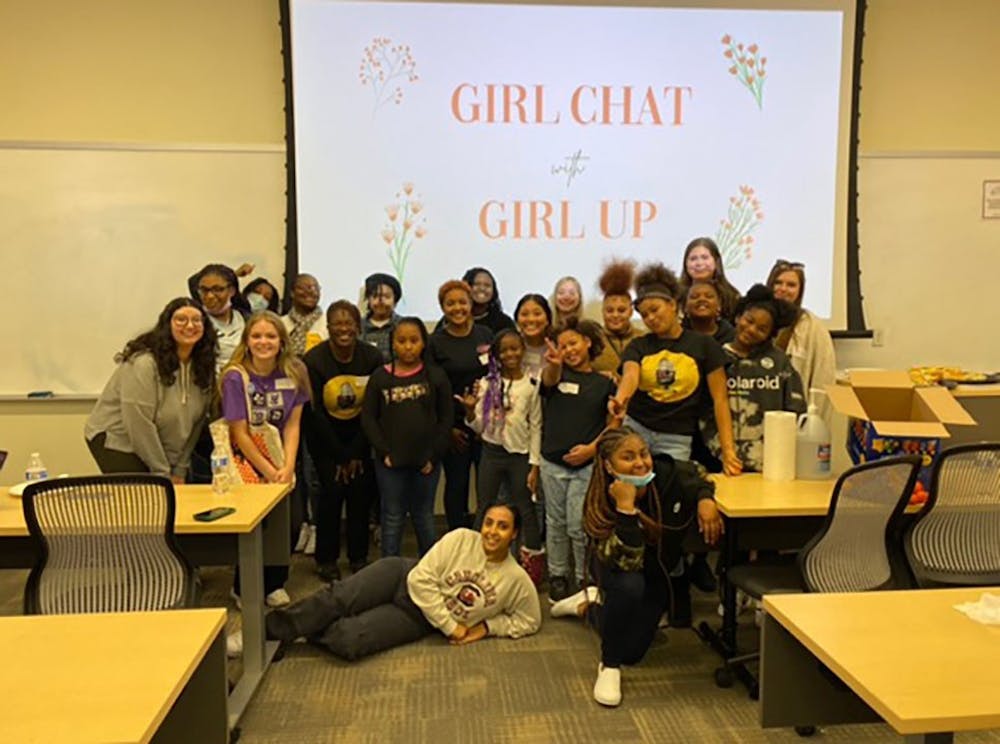After fourth-year biology student Grace Towery noticed a lack of leadership development options and supportive spaces for women on USC's campus, she decided to change that by bringing Girl Up to campus.
The club is a subsidiary of Girl Up Campaign, a non-profit organization hosted at the United Nations.Today, Girl Up works to create a space of empowerment and support for women on campus through action and discussion.
They do this by establishing a member network of female student leaders across campus, as well as female professionals to discuss how to balance a career and a social life as a woman. This all stems from a desire to encourage members to learn and achieve their goals through this support network and gives them the confidence to feel comfortable in their leadership abilities.
Meetings for the close-knit club of 15 members are casual. The executive board gives weekly updates on upcoming events, such as service opportunities or self-defense workshops, then opens the floor to discuss trending topics, like the unprecedented first of the election of Vice President Kamala Harris in 2020.
Towery credits the rise of the Black Lives Matter movement as inspiration for starting the club because Girl Up functions as an outlet to uplift the voices of all women, especially women of color.
The club "focuses on surpassing the hardships that women face, that lots of times people sort of pass over or think that it's in the past," second-year English and media arts student Sophie Conrad said.
Conrad believes being a woman comes with the burden of knowingly being perceived differently in personal and professional settings. And this isn't just the case for women, it is also undeniably shared by the LGBTQIA+ community, Conrad said.
She also hopes Girl Up is a reminder that feminism is always needed as a means to combat the overlapping inequalities posed by sexism and homophobia.Girl Up works to dismantle the negative misogynistic views of feminism and instead build a foundation that normalizes support for basic women’s rights.
In this same sense, women are often underestimated, making it difficult for them to receive deserved recognition, fourth-year psychology and criminal justice student Ashlee Miller said.
“It's easy to just kind of feel like your voice isn't as important,” Towery said. “There have been times in some of my classes that I've just felt like, if I said, 'well, this is what I think the answer is,' it just didn't mean as much as maybe what my male counterparts maybe said.”
For leadership development, members are encouraged to voice their goals and career women established in their fields come as guest speakers to support them in their endeavors.
As part of their service initiative, Girl Up partnered with the Women's Rights and Empowerment Network and Hannah House, a transitional shelter in Columbia, to teach young girls about higher education.
Miller said these girls often don't see a future with higher education because the world has taught them it is not possible.
Last fall, Girl Up hosted girls from Hannah House on campus and talked to them about how and why they too could choose higher education.
Although most meeting discussions focus on issues local to America, the chapter also delves into matters of lack of education for women and gender-based violence in other countries. Towery hopes this instills a sense of gratitude in members and a desire to be part of the change.
"If all women aren't succeeding, then women in general aren't succeeding because there's always going to be those people who are left behind that people don't think about,” Conrad said.
She emphasized the importance of being informed on global women’s rights issues and holding the hands of women who haven’t been afforded the same privileges and opportunities of higher education.

